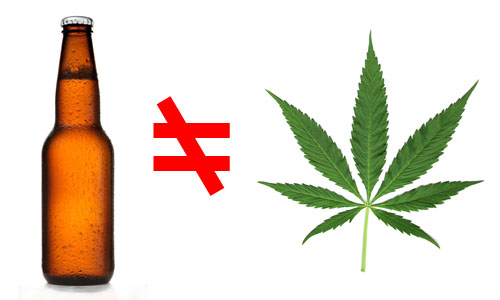From Alcohol to Marijuana: Applying Regulatory Lessons Learned
 On November 9th, California became the largest state in the union to legalize marijuana. Prop 64 cleared the way for personal use and cultivation; however, provisions for opening medical marijuana retailers to allow for recreational purchases don’t come into effect until 2018. When that happens, it will open the taps on what NORML estimates to be a $3 to $5 billion market. It is essential that responsible statewide regulation proven this industry from attaining the entrenchment, lobbying power, and potential for unchecked harm enjoyed by the alcohol industry.
On November 9th, California became the largest state in the union to legalize marijuana. Prop 64 cleared the way for personal use and cultivation; however, provisions for opening medical marijuana retailers to allow for recreational purchases don’t come into effect until 2018. When that happens, it will open the taps on what NORML estimates to be a $3 to $5 billion market. It is essential that responsible statewide regulation proven this industry from attaining the entrenchment, lobbying power, and potential for unchecked harm enjoyed by the alcohol industry.
As currently constructed, retail marijuana regulation will be under the purview of the Bureau of Marijuana Control (BMC) within the Department of Consumer Affairs. Alcohol Justice strongly urges the BMC to adopt and enforce the following policies:
- Limit the availability to marijuana stores and prevent crossover marketing with alcohol and tobacco products
- Limit advertising, especially outdoor billboards and online ads, both of which can be easily used to target youth
- Require marijuana be sold in generic packaging
- Ensure excise taxes remain set at levels that discourage youth use, and are regularly revisited to ensure continued efficacy
- Limit licenses to prevent oversaturation of marijuana outlets in any given geographic region
- Ban cross-marketing with alcohol and tobacco companies, including marijuana-tobacco “spliffs” and cannabinoid-infused spirits
The text of the proposition suggest some work towards these goals. For instance, alcohol and tobacco products cannot be sold in retail dispensaries. There are some limitations on advertising and packaging meant to reduce the appeal to children, but the exact parameters of youth-oriented marketing remain undefined. Many provisions allow the California Department of Public Health to enact more stringent rules if it deems necessary, and Alcohol Justice calls on the Department to exercise this power to bring BMC rules into closer alignment with the principles detailed above.
As the largest and most prosperous state in the U.S., California is in the position to serve as a leader and model for the creation of a responsible marijuana industry. By adopting strong and sensible regulations, California can protect individual growers, local dispensary owners, and the health of the public from the reckless power of another Big Industry.
FULL TEXT of Prop 64.
Help us hold Big Alcohol accountable for the harm its products cause.
| GET ACTION ALERTS AND eNEWS |
STAY CONNECTED    |
CONTACT US 24 Belvedere St. San Rafael, CA 94901 415-456-5692 |
SUPPORT US Terms of Service & Privacy Policy |


